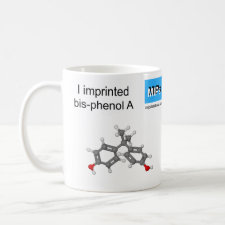
Authors: He C, Zhao WF, Liu YQ, Sun SD, Zhao CS
Article Title: Molecularly imprinted polyethersulfone membranes for the sieving, binding and recognition of bisphenol A.
Publication date: 2014
Journal: Desalination and Water Treatment
Volume: 52
Issue: (31-33)
Page numbers: 5781-5789.
DOI: 10.1080/19443994.2013.819146
Abstract: Bisphenol A (BPA) molecularly imprinted polyethersulfone (PES) membranes were prepared by a liquid-liquid phase inversion technique. The BPA template molecules were then extracted from the solidified PES membranes by ethanol. BPA aqueous solutions with various concentrations were applied to the membranes to study the sieving performance. It was indicated that the sieving coefficient of the molecularly imprinted membranes was smaller than that of the non-imprinted ones due to the specific recognition sites. With the increase of BPA initial concentrations, the binding amounts of BPA increased. The recognition coefficients of BPA were 2.43, 2.18, and 1.91 for the BPA concentrations of 50, 100, and 150 μmol/L, respectively. Furthermore, it was observed that with the increase of operation pressure, the binding amounts for the imprinted membranes decreased dramatically, which, however, does not occur for the non-imprinted ones. The recognition coefficients of BPA under the pressures of 0.01, 0.03, and 0.06 MPa were 2.18, 1.64, and 1.39, respectively
Template and target information: bisphenol A, BPA
Author keywords: molecularly imprinted, liquid-liquid phase inversion technique, Flat-sheet membrane, BPA, Recognition



Join the Society for Molecular Imprinting

New items RSS feed
Sign-up for e-mail updates:
Choose between receiving an occasional newsletter or more frequent e-mail alerts.
Click here to go to the sign-up page.
Is your name elemental or peptidic? Enter your name and find out by clicking either of the buttons below!
Other products you may like:
 MIPdatabase
MIPdatabase









